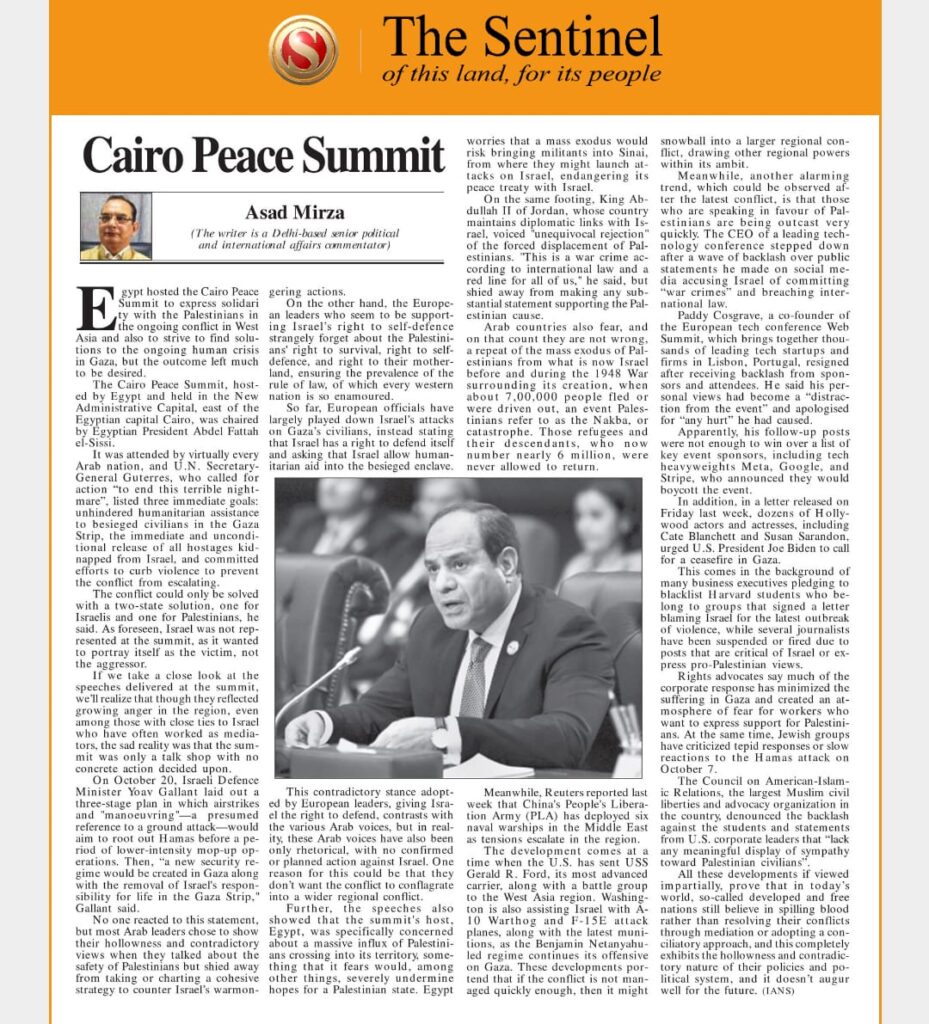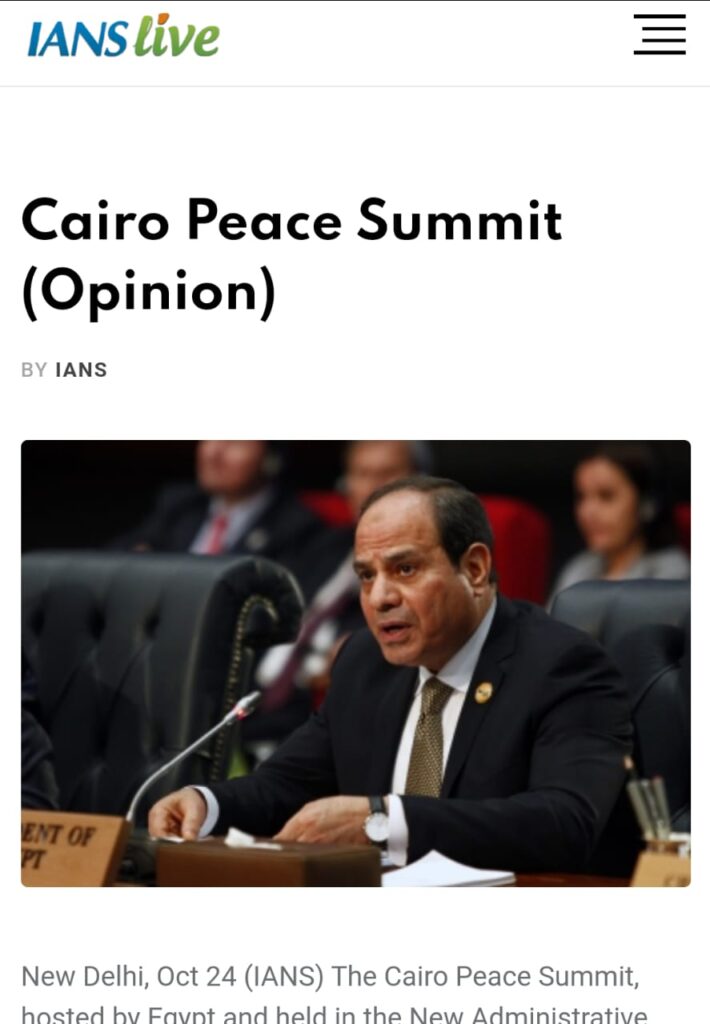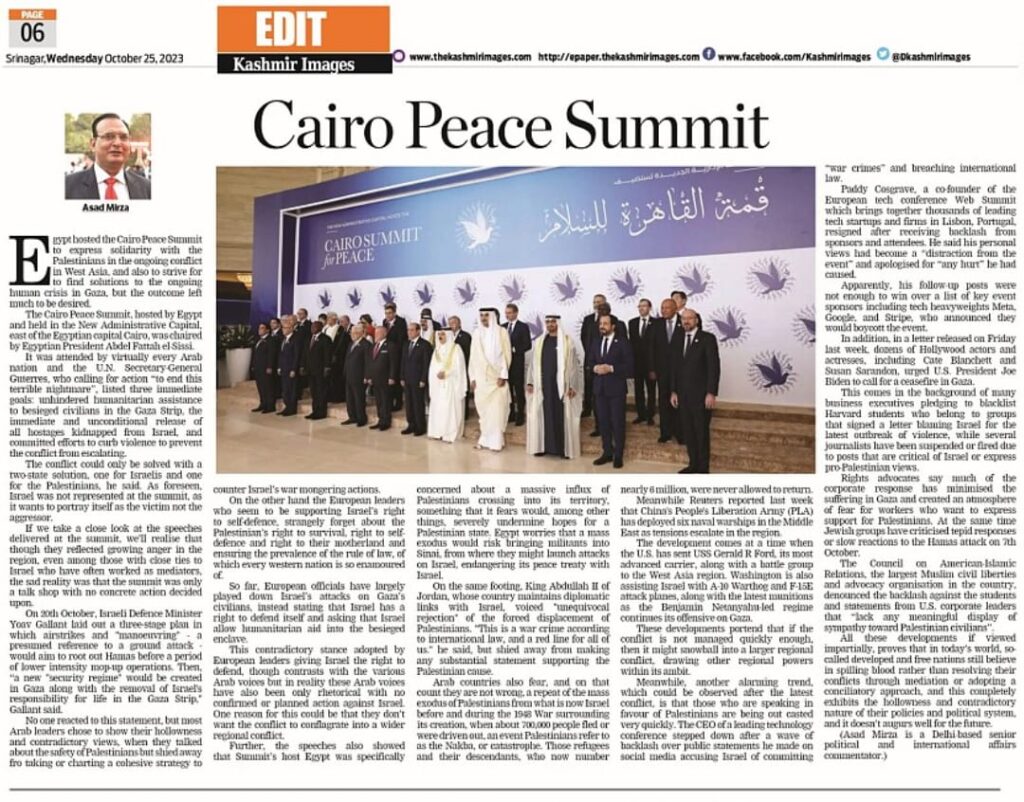137 total views, 1 views today



- https://www.scoopnews.in/det.aspx?q=126716
- https://theindianawaaz.com/cairo-peace-summit-outcomes-remain-elusive/
- https://morungexpress.com/cairo-peace-summit
- https://www.daijiworld.com/news/newsDisplay?newsID=1133309
- https://nagalandpost.com/index.php/cairo-peace-summit/
- https://thekashmirimages.com/2023/10/24/cairo-peace-summit/
- https://in.investing.com/news/cairo-peace-summit-opinion-3863366
- https://ianslive.in/cairo-peace-summit-opinion–20231024133151
- https://bhaskarlive.in/cairo-peace-summit-opinion/
- https://www.sakshipost.com/news/cairo-peace-summit-opinion-240898
- https://weeklyvoice.com/cairo-peace-summit-opinion-2/
- https://telugustop.com/cairo-peace-summit-opinion-latest-eng-news-11812602
- https://gyanhigyan.com/international/cairo-peace-summit-opinion-20231024133151/cid12543361.htm
- https://www.lokmattimes.com/international/cairo-peace-summit-opinion
- https://www.socialnews.xyz/2023/10/24/cairo-peace-summit-opinion/
- https://english.ajitweekly.com/2023/10/24/cairo-peace-summit-opinion/#google_vignette
Cairo Peace Summit
Egypt hosted the Cairo Peace Summit to express solidarity with the Palestinians in the ongoing conflict in West Asia, and also to strive for to find solutions to the ongoing human crisis in Gaza, but the outcome left much to be desired.
The Cairo Peace Summit, hosted by Egypt and held in the New Administrative Capital, east of the Egyptian capital Cairo, was chaired by Egyptian President Abdel Fattah el-Sissi.
It was attended by virtually every Arab nation and the U.N. Secretary-General Guterres, who calling for action “to end this terrible nightmare”, listed three immediate goals: unhindered humanitarian assistance to besieged civilians in the Gaza Strip, the immediate and unconditional release of all hostages kidnapped from Israel, and committed efforts to curb violence to prevent the conflict from escalating.
The conflict could only be solved with a two-state solution, one for Israelis and one for the Palestinians, he said. As foreseen, Israel was not represented at the summit, as it wants to portray itself as the victim not the aggressor.
If we take a close look at the speeches delivered at the summit, we’ll realise that though they reflected growing anger in the region, even among those with close ties to Israel who have often worked as mediators, the sad reality was that the summit was only a talk shop with no concrete action decided upon.
On 20th October, Israeli Defence Minister Yoav Gallant laid out a three-stage plan in which airstrikes and “manoeuvring” – a presumed reference to a ground attack – would aim to root out Hamas before a period of lower intensity mop-up operations. Then, “a new “security regime” would be created in Gaza along with the removal of Israel’s responsibility for life in the Gaza Strip,” Gallant said.
No one reacted to this statement, but most Arab leaders chose to show their hollowness and contradictory views, when they talked about the safety of Palestinians but shied away fro taking or charting a cohesive strategy to counter Israel’s war mongering actions.
On the other hand the European leaders who seem to be supporting Israel’s right to self-defence, strangely forget about the Palestinian’s right to survival, right to self-defence and right to their motherland and ensuring the prevalence of the rule of law, of which every western nation is so enamoured of.
So far, European officials have largely played down Israel’s attacks on Gaza’s civilians, instead stating that Israel has a right to defend itself and asking that Israel allow humanitarian aid into the besieged enclave.
This contradictory stance adopted by European leaders giving Israel the right to defend, though contrasts with the various Arab voices but in reality these Arab voices have also been only rhetorical with no confirmed or planned action against Israel. One reason for this could be that they don’t want the conflict to conflagrate into a wider regional conflict.
Further, the speeches also showed that Summit’s host Egypt was specifically concerned about a massive influx of Palestinians crossing into its territory, something that it fears would, among other things, severely undermine hopes for a Palestinian state. Egypt worries that a mass exodus would risk bringing militants into Sinai, from where they might launch attacks on Israel, endangering its peace treaty with Israel.
On the same footing, King Abdullah II of Jordan, whose country maintains diplomatic links with Israel, voiced “unequivocal rejection” of the forced displacement of Palestinians. “This is a war crime according to international law, and a red line for all of us.” he said, but shied away from making any substantial statement supporting the Palestinian cause.
Arab countries also fear, and on that count they are not wrong, a repeat of the mass exodus of Palestinians from what is now Israel before and during the 1948 War surrounding its creation, when about 700,000 people fled or were driven out, an event Palestinians refer to as the Nakba, or catastrophe. Those refugees and their descendants, who now number nearly 6 million, were never allowed to return.
Meanwhile Reuters reported last week that China’s People’s Liberation Army (PLA) has deployed six naval warships in the Middle East as tensions escalate in the region.
The development comes at a time when the U.S. has sent USS Gerald R Ford, its most advanced carrier, along with a battle group to the West Asia region. Washington is also assisting Israel with A-10 Warthog and F-15E attack planes, along with the latest munitions as the Benjamin Netanyahu-led regime continues its offensive on Gaza.
These developments portend that if the conflict is not managed quickly enough, then it might snowball into a larger regional conflict, drawing other regional powers within its ambit.
Meanwhile, another alarming trend, which could be observed after the latest conflict, is that those who are speaking in favour of Palestinians are being out casted very quickly. The CEO of a leading technology conference stepped down after a wave of backlash over public statements he made on social media accusing Israel of committing “war crimes” and breaching international law.
Paddy Cosgrave, a co-founder of the European tech conference Web Summit which brings together thousands of leading tech startups and firms in Lisbon, Portugal, resigned after receiving backlash from sponsors and attendees. He said his personal views had become a “distraction from the event” and apologised for “any hurt” he had caused.
Apparently, his follow-up posts were not enough to win over a list of key event sponsors including tech heavyweights Meta, Google, and Stripe, who announced they would boycott the event.
In addition, in a letter released on Friday last week, dozens of Hollywood actors and actresses, including Cate Blanchett and Susan Sarandon, urged U.S. President Joe Biden to call for a ceasefire in Gaza.
This comes in the background of many business executives pledging to blacklist Harvard students who belong to groups that signed a letter blaming Israel for the latest outbreak of violence, while several journalists have been suspended or fired due to posts that are critical of Israel or express pro-Palestinian views.
Rights advocates say much of the corporate response has minimised the suffering in Gaza and created an atmosphere of fear for workers who want to express support for Palestinians. At the same time Jewish groups have criticised tepid responses or slow reactions to the Hamas attack on 7th October.
The Council on American-Islamic Relations, the largest Muslim civil liberties and advocacy organisation in the country, denounced the backlash against the students and statements from U.S. corporate leaders that “lack any meaningful display of sympathy toward Palestinian civilians”.
All these developments if viewed impartially, proves that in today’s world, so- called developed and free nations still believe in spilling blood rather than resolving their conflicts through mediation or adopting a conciliatory approach, and this completely exhibits the hollowness and contradictory nature of their policies and political system, and it doesn’t augurs well for the future.
